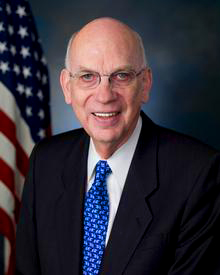Bob Bennett (politician) facts for kids
Quick facts for kids
Bob Bennett
|
|
|---|---|
 |
|
| United States Senator from Utah |
|
| In office January 3, 1993 – January 3, 2011 |
|
| Preceded by | Jake Garn |
| Succeeded by | Mike Lee |
| Personal details | |
| Born |
Robert Foster Bennett
September 18, 1933 Salt Lake City, Utah, U.S. |
| Died | May 4, 2016 (aged 82) Arlington, Virginia, U.S. |
| Resting place | Salt Lake City Cemetery |
| Political party | Republican |
| Spouse |
Joyce McKay
(m. 1962) |
| Children | 6 |
| Parent |
|
| Education | University of Utah (BS) |
| Military service | |
| Allegiance | |
| Branch/service | |
| Years of service | 1957–1969 |
| Unit | Utah Army National Guard Army Chaplain Corps |
Robert Foster Bennett (born September 18, 1933 – died May 4, 2016) was an American politician and businessman. He served as a U.S. Senator for the state of Utah. He was a member of the Republican Party from 1993 to 2011.
As a senator, Bob Bennett held important roles on many committees. These included committees for banking, government spending, and energy. He was known for being a conservative politician for most of his time in office.
However, in 2010, some people felt he was not conservative enough. This was partly because he supported a plan to help banks during a tough economic time. Even with support from Mitt Romney, he did not win his party's nomination for re-election.
After leaving the Senate, Bennett continued to work in public service. He became a senior advisor at a law firm and led a consulting company. He also taught and lectured at universities, sharing his knowledge of politics. He focused on important topics like the national budget, energy, and health care.
Contents
Early Life and Career
Bob Bennett was born in Salt Lake City, Utah, on September 18, 1933. His father, Wallace F. Bennett, was also a U.S. Senator. His grandfather, Heber J. Grant, was a president of the Church of Jesus Christ of Latter-day Saints.
He went to East High School and then the University of Utah. In 1957, he earned a degree in Political Science. While at the university, he was also the Student Body President.
After college, Bennett joined the Utah Army National Guard. He served for six months and later became a Chaplain. He worked for his family's paint and glass business for a few years.
In 1963, he moved to Washington, D.C. He worked as a press secretary for a Utah Congressman. Later, he worked for his father. He also held a position in the Nixon Administration, helping with transportation issues.
Bennett also had a successful career in business. He led several companies, including a public relations firm. He became CEO of Franklin International Institute, which created the popular Franklin Day Planners. This company grew into Franklin Quest and became a public company. He stepped down as CEO in 1991 to run for the Senate.
Serving in the U.S. Senate (1993–2011)
Becoming a Senator
In 1992, a Senate seat opened up in Utah. Bob Bennett won a close election to become the Republican candidate. He then defeated his Democratic opponent, Wayne Owens, in the main election.
He was re-elected two more times, in 1998 and 2004. In 2004, he won by a large margin against Paul Van Dam.
His Last Election Campaign
In 2010, Senator Bennett faced many challengers from his own party. Despite being popular, he was defeated at the Utah Republican Convention. He finished third, meaning he could not run for re-election.
Many people encouraged him to run as a write-in candidate. However, he decided not to, to avoid creating more political tension in the state.
Key Roles and Committees
During his time in the Senate, Bennett was a key member of the Republican leadership. He served as the Chief Deputy Republican Party "Whip". This meant he helped guide his party's legislative plans.
He was also a member of several important Senate committees:
- Committee on Appropriations: This committee decides how the government spends money.
- Committee on Banking, Housing, and Urban Affairs: This committee deals with banks, housing, and city development.
- Committee on Energy and Natural Resources: This committee focuses on energy and natural resources.
- Committee on Rules and Administration: This committee handles the rules and daily operations of the Senate.
- Joint Economic Committee: This committee studies economic issues.
Personal Life
In 1962, Bob Bennett married Joyce McKay. They had six children: Julie, Robert, James, Wendy, Heather, and Heidi. They also had 20 grandchildren.
Bob Bennett passed away on May 4, 2016, at the age of 82. He died at his home in Arlington, Virginia, after battling pancreatic cancer and having a stroke.
In his final days, he expressed regret for some of the harsh political talk happening at the time.
See also
 In Spanish: Robert Foster Bennett para niños
In Spanish: Robert Foster Bennett para niños
 | Janet Taylor Pickett |
 | Synthia Saint James |
 | Howardena Pindell |
 | Faith Ringgold |

